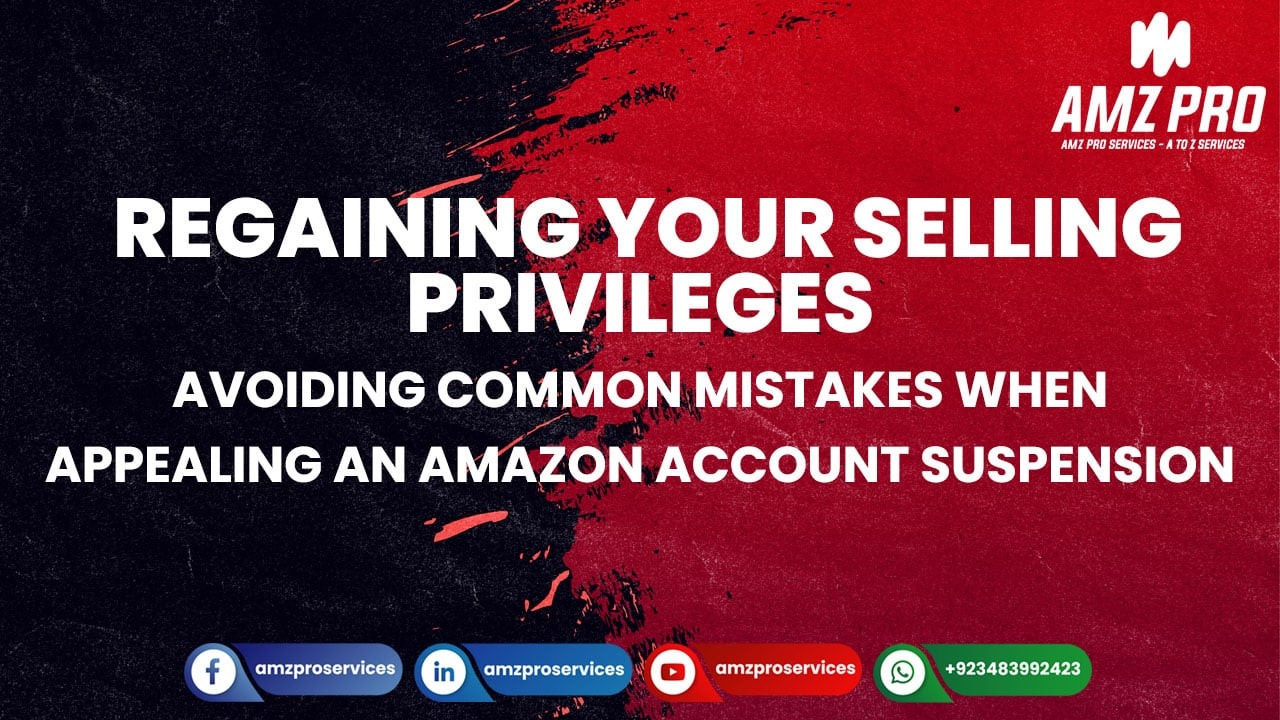Top mistakes to avoid when trying to ungating products on Amazon.
Ungating products on Amazon can be a great way to expand your business and reach new customers. However, it can also be a challenging process that requires a significant amount of time and effort. While there are many benefits to getting ungated, there are also many common mistakes that sellers make that can delay or even prevent them from getting ungated. In this blog, we'll discuss the top mistakes to avoid when trying to ungating products on Amazon.
Failing to Understand Amazon's Policies and Guidelines:
One of the most common mistakes that sellers make when trying to get their products ungated is failing to understand Amazon's policies and guidelines. Amazon has strict rules regarding ungating, and it's important for sellers to understand these rules before applying for ungating. Sellers should familiarize themselves with Amazon's policies and guidelines, including legal and trademark issues, to ensure that their products meet the requirements for ungating.
Amazon has policies in place to ensure that sellers comply with laws and regulations, such as product safety standards and intellectual property laws. Sellers must provide documentation to prove that their products meet these requirements. Failure to comply with Amazon's policies can result in account suspension or termination.
To avoid this mistake, sellers should read Amazon's policies and guidelines carefully and seek clarification if they have any questions. They should also research legal and trademark issues to ensure that their products comply with applicable laws and regulations.
Providing Incomplete or Inaccurate Documentation:
Another common mistake that sellers make when trying to get their products ungated is providing incomplete or inaccurate documentation. Amazon requires sellers to provide specific documentation to prove ownership of trademarks and patents, as well as to demonstrate compliance with legal and trademark issues. Sellers should ensure that they provide all necessary documentation and that the documentation is accurate and up-to-date.
Inaccurate or incomplete documentation can result in a delay or denial of the ungating process. To avoid this mistake, sellers should double-check their documentation and ensure that they have provided all necessary information. They should also ensure that their documentation is up-to-date and that it reflects any changes to their business, such as a change in ownership or new trademark registration.
Applying for Ungating Too Early:
Sellers who are new to Amazon may be eager to apply for ungating as soon as possible. However, applying for ungating too early can result in a denial and delay the process. Sellers should wait until they have established a positive selling history on Amazon before applying for ungating.
Amazon wants to see that sellers have a history of selling successfully on the platform before granting them access to restricted categories or products. To avoid this mistake, sellers should focus on building a positive selling history on Amazon before applying for ungating. They should also monitor their seller metrics, such as product ratings and customer feedback, to ensure that they are meeting Amazon's performance standards.
Failing to Address Previous Policy Violations:
If a seller has previously violated Amazon's policies, their application for ungating may be denied. Sellers should address any previous policy violations and work to improve their seller metrics before applying for ungating.
Amazon takes policy violations seriously and will not grant ungating privileges to sellers who have a history of non-compliance. To avoid this mistake, sellers should take steps to address any previous policy violations and work to improve their seller metrics. This may involve improving their customer service, resolving any outstanding issues, and improving their product quality.
Rushing the Application Process:
The application process for ungating can be lengthy and complex. Rushing the process and submitting incomplete or inaccurate information can result in a denial. Sellers should take their time when filling out the application and ensure that all information is accurate and complete.
Ungating applications require a significant amount of documentation and may take several weeks or months to process. Rushing the process can lead to mistakes, which can result in denial. To avoid this mistake, sellers should take their time when filling out the application and ensure that they have provided all necessary information. They should also double-check their work before submitting the application.
Not Seeking Legal Advice:
Legal issues can be complex, and it can be difficult for sellers to navigate them without the help of a legal professional. Sellers who are unsure about legal and trademark issues should consider seeking legal advice before applying for ungating.
Ungating can involve complex legal issues, such as trademark and patent ownership. If a seller is unsure about these issues, they should seek legal advice to ensure that they are in compliance with applicable laws and regulations. To avoid this mistake, sellers should consult with a legal professional if they have any questions or concerns about legal and trademark issues.
Failing to Maintain Compliance After Getting Ungated:
Getting ungated is not the end of the process. Sellers must continue to maintain compliance with Amazon's policies and guidelines after getting ungated. Failure to comply can result in the loss of ungating privileges and damage to the seller's reputation on Amazon.
Maintaining compliance with Amazon's policies and guidelines is essential for any seller looking to operate successfully on the platform. Sellers should regularly monitor their product listings and ensure that they are in compliance with Amazon's policies. They should also monitor their seller metrics and address any issues that arise.
Conclusion:
Ungating products on Amazon can be a complex and challenging process. Avoiding these common mistakes can increase the chances of success and help sellers get their products ungated more quickly. Sellers should understand Amazon's policies and guidelines, provide accurate and complete documentation, wait until they have established a positive selling history on Amazon before applying for ungating, address any previous policy violations, take their time when filling out the application, seek legal advice if necessary, and continue to maintain compliance after getting ungated. By avoiding these mistakes and taking a strategic approach, sellers can increase their chances of success and grow their businesses on Amazon.

